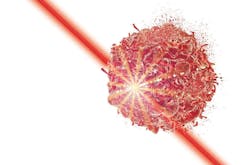NIH licenses cancer-killing near-IR photoimmunotherapy to startup
In the process of developing imaging probes and near-infrared (near-IR) fluorophores to aid in the identification of cancerous tumors, senior investigator in the Molecular Imaging Program at the National Cancer Institute/National Institutes of Health (NIH; Bethesda, MD) and leader of the Laboratory of Molecular Theranostics (LMT) Hisataka Kobayashi and LMT colleagues discovered a new dye (IRDye700DX) that is highly lethal to cancer cells when conjugated to an antibody.
Unlike standard photodynamic therapy (PDT), the dye does not need to be internalized by the cell, but is applied to the cell membrane and activated with low-energy (150 mW/cm2) deep-red light (690 nm) from an LED or a laser system, effectively killing cancer cells through necrosis and stimulating the release of antigenic intracellular contents that initiate immunity against surviving cancer cells, even at some distance from the killed cells. Tumors in both mice and humans were seen to shrink beginning 24 hours after treatment.This patented near-IR photoimmunotherapy (NIR-PIT) was licensed by the NIH to Rakuten Medical (San Mateo, CA), which raised $284 million in Series C financing in late 2018 and has since received Fast Track designation by the FDA for a Phase 3 trial to evaluate NIR-PIT therapy to treat recurrent head and neck squamous cell carcinomas. Reference: H. Kobayashi, Proc. SPIE, 10893, 1089302 (Mar. 4, 2019).
About the Author

Gail Overton
Senior Editor (2004-2020)
Gail has more than 30 years of engineering, marketing, product management, and editorial experience in the photonics and optical communications industry. Before joining the staff at Laser Focus World in 2004, she held many product management and product marketing roles in the fiber-optics industry, most notably at Hughes (El Segundo, CA), GTE Labs (Waltham, MA), Corning (Corning, NY), Photon Kinetics (Beaverton, OR), and Newport Corporation (Irvine, CA). During her marketing career, Gail published articles in WDM Solutions and Sensors magazine and traveled internationally to conduct product and sales training. Gail received her BS degree in physics, with an emphasis in optics, from San Diego State University in San Diego, CA in May 1986.

